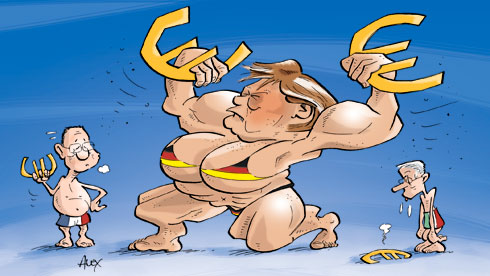The widespread feeling that ground was ceded under pressure from the "Diktat" of Germany, which insisted that the single European supervisor would have no oversight of its local banks, has spurred criticisms. This content has been removed under request of the copyright owner.
"The agreement seems to be on a large scale, but in reality it is not enough," writes NRC Handelsblad. "Coming four years after the start of the subprime crisis, it's disappointing." The Dutch newspaper particularly regrets that –

The vast majority of the 6,000 [European] banks remain the responsibility of the national regulators, and therefore depend on mutual trust between banks, which in the past has been more wobbly than we thought. The subprime crisis has revealed just how interlinked all the banks are. No one saw that clearly until it all fell apart. Look at what happened in Iceland and especially in the Fortis affair, where national interests took precedence over the general interest. Only a centralised monitoring authority for all banks can combat that. In addition, decisions have not yet been made on two critical follow-up steps: the closure of banks that fail, and a common financial safety net that would separate the fate of the states from that of the banks.
Receive the best of European journalism straight to your inbox every Thursday
In Germany, the Frankfurter Allgemeine Zeitung unleashes a salvo of arguments that the new banking supervision is very bad news, coming as it does just when banks in the eurozone are carrying three times more debt than the member states. For the FAZ, the central problem is the omnipotence of the European Central Bank (ECB) – an unelected institution, the daily observes. Wearing two hats – central bank and supervisory authority – it will not be able to fulfill its function of guaranteeing price stability.
Interesting article?
It was made possible by Voxeurop’s community. High-quality reporting and translation comes at a cost. To continue producing independent journalism, we need your support.

While joint supervision of European banks makes sense, placing that supervisory authority under the roof of the ECB is very far from being a sound idea. Until now, the sole obligation of the ECB was to ensure price stability. Henceforth, the supervisory role will force it to live with a conflict of objectives. How will it decide if inflation requires an increase in interest rates, when that is precisely what may bring down the banks? Finally, one may doubt whether the ECB will come down all that harshly on financial institutions that they have been keeping alive as zombie banks for years by injecting money into them.
An ”erroneous model" has been chosen for the banking union notes the El País daily. It's been a decision "imposed" by Germany and it will "fracture" the European financial market into two major blocks: the big institutions, under the supervision of the ECB, and those with assets of less than €30bn left under the supervision of national governments. The Madrid daily has some criticisms –

The agreement corresponds point by point to the German demands. Angela Merkel has already told the Bundestag that the agreement was a German triumph; and now the time has come to explain why a triumph for Germany can turn into a financial mistake for Europe. The objective of the triumphal proposal of [Finance Minister Wolfgang] Schäuble is to hide the bleak situation of the German savings banks and the banks of the German Länder. The pretext used to achieve this was to suggest putting only those banks that would present a systemic risk to Europe under the supervision of the ECB. The reality, however, as shown by the case of Spain, is that smaller institutions are also capable of injecting toxins into the national banking system. And this circumstance invalidates the German argument that supervision of its regional banks is irrelevant, because Germany would pay for any eventual consolidation of these institutions. The risk is not bankruptcy, but the contamination of assets.
It’s an argument that its colleague ABC takes up: ”What Germany is hiding", it writes, is the poor state of the regional banks. This

explains a good deal of the political manoeuvring of Angela Merkel, who has been able to defend her financial system and to mask her misdeeds like no other leader in Europe. Brussels has never liked the savings banks, but the new Iron Lady has managed to turn Germany into their last bastion, despite their complicity in the [financial] problems. The Landesbanken are engaged in highly risky international operations that have left a steep bill. The problems of Germany remain in Germany, [which] has made it clear that it does not like others to ferret about in its finances. Despite any banking union, only the Bundesbank can do that for the moment.












